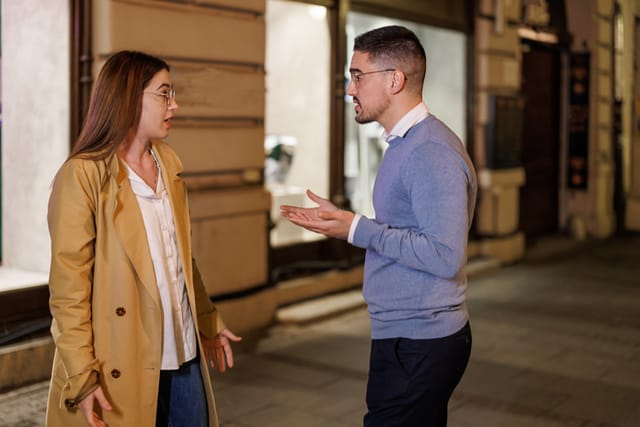There’s nothing worse than dealing with people who try to make you feel bad for doing what’s right for you. Whether it’s turning down a social invitation, declining to help them solve their problems, or simply making decisions that prioritize yourself, guilt-trippers will go to great lengths to make you feel bad about it. When that happens, here are some things you can say in return.
1. “I’m sorry you’re upset, but my decision is final.”

This response shows empathy while still asserting your stance. It’s a polite but firm way of expressing that you won’t be swayed by their guilt trip and that you’re going to do what you want regardless of how they feel about it. It’s important to stand firm in your decisions, especially when they’re in your best interest.
2. “I understand your perspective, but I have to do what’s best for me.”

This lets the guilt-tripper know that while you respect their viewpoint, you won’t allow it to dictate your decisions in life. You’re acknowledging them but staying true to your needs, which are valid and need to be prioritized. You control your own destiny, and you have to feel confident in the decisions you make.
3. “Guilt-tripping isn’t a productive way to communicate.”

This calls out their tactic directly, making it clear that you’re aware of their intentions and won’t be manipulated. It encourages more open, honest, and respectful communication instead. If they can’t handle that, they don’t need to be a part of your life.
4. “I’m allowed to say ‘no’ without feeling guilty.”

This serves as a reminder to both them and yourself that it’s okay to set boundaries and make decisions that prioritize your needs. It’s a powerful affirmation of your personal autonomy. Saying “no” without feeling guilty is something everyone should be able to do in life. You don’t have to be a people pleaser.
5. “It seems like you’re trying to make me feel bad about my decision.”

By pointing out their guilt-tripping, you’re taking a step towards stopping the cycle. You’re making it clear that you recognize their manipulation and that you’re not going to put out with it. Sometimes calling someone out for their behavior is what they need in order to snap out of it.
6. “I need to stand by my choices, even if they disappoint you.”

This comeback emphasizes the importance of your autonomy. It lets them know that you value their feelings but won’t let them control your decisions. It’s crucial to stay true to yourself, even when someone doesn’t agree with your decisions or tries to fight you on them. You’re worth more than that.
7. “I respect your feelings, but I can’t change my decision based on guilt.”

This response shows empathy while still asserting your independence. It sends the message that your decisions won’t be influenced by guilt. It’s a crucial assertion of your right to make decisions without someone trying to coerce or manipulate you to get their own way.
8. “Let’s discuss this when we’ve both calmed down.”

Sometimes the best response is to take a break from the conversation. This allows both parties to cool down and approach the situation more rationally. It’s a great way to ensure that emotions don’t escalate and cloud the conversation.
9. “I value our relationship too much to let guilt guide our decisions.”

This comeback communicates the importance you place on a healthy relationship, which shouldn’t be manipulated by guilt. It shows your commitment to maintaining a positive and balanced dynamic.
10. “Your disappointment is not a reason for me to change my mind.”

This is a direct way of saying that while you acknowledge their feelings, you won’t be swayed by emotional manipulation. This reinforces the idea that your decisions are based on your own needs and not on the approval of others.
11. “My decision might upset you, but it’s the right choice for me.”

This response emphasizes that your choices are based on your needs and not on pleasing others. It’s a reminder that it’s okay to prioritize your own well-being, even if others disagree.
12. “I am not responsible for your happiness.”

This comeback might seem harsh, but it can be necessary when dealing with manipulative individuals. It asserts the fact that each person is responsible for their own emotions. It’s an important reminder that you can’t carry the emotional burden for others.
13. “I can’t help you if I’m constantly feeling guilty.”

This response highlights the fact that guilt-tripping doesn’t foster a healthy, supportive relationship. It underscores the need for mutual respect and understanding in any relationship.
14. “I won’t apologize for doing what’s best for me.”
This comeback makes it clear that you have no reason to feel guilty for prioritizing your own needs. It’s a powerful assertion of your right to make decisions that benefit you, without feeling the need to justify them.
15. “I won’t be guilt-tripped into changing my decision.”
This is a straightforward response that leaves no room for misinterpretation. It’s a firm refusal to be manipulated by guilt. This reinforces your position and underlines your determination to stand your ground.
16. “I understand that you’re upset, but I won’t let that control my decisions.”
This response shows empathy while also asserting your independence. It sends the message that while you’re sensitive to their feelings, their upset won’t dictate your actions. It’s an essential part of establishing boundaries and maintaining your autonomy.
17. “I won’t let guilt influence my decisions.”

This is a clear and straightforward response that emphasizes your refusal to be manipulated by guilt. It not only asserts your position but also communicates the expectation of respectful and guilt-free interactions. It’s an important stance that promotes healthier and more balanced relationships.
Enjoy this piece? Give it a like and follow Bolde on MSN for more!






